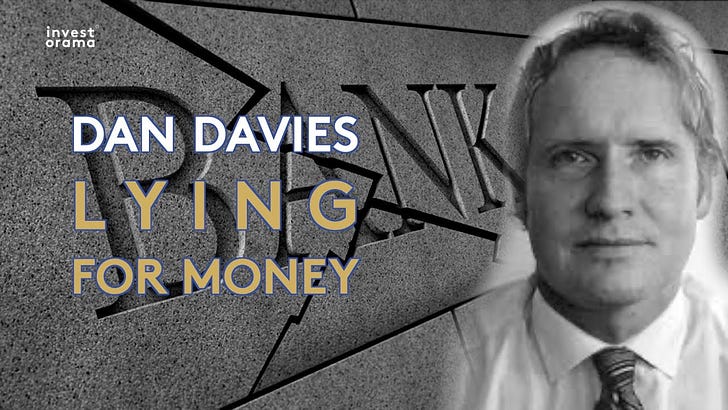🎧Fraud, Trust, Confidence and Banking Crises - with Dan Davies author of Lying for Money
I got to speak with an expert on banking crisis, one day after the collapse of Credit Suisse - when I really meant to discuss his book on fraud through history.
Hi! It’s George from Investorama, your guide to the future of investing - without the hype.
I wrote about a book that can help you avoid financial fraud. It turns out that its author, Dan Davies, is also THE expert on banking crises, and I interviewed him on the podcast the day after the collapse of Credit Suisse. The stars are aligned.
Dan Davies is the author of Lying for Money and a specialist in banking crises. We discuss the latest string of banking failures, particularly Silicon Valley Bank and Credit Suisse, and what that means for the financial system.
Listen or Watch
Read on to find some highlights of our conversation. Or you can listen to the episode on every podcast platform or watch it on YouTube.
We speak in detail about Credit Suisse, AT1 bonds and fraud in the system. There’s too much to summarize, but below are a few quotes.
On Credit Suisse & SVB
Silicon Valley Bank looks like it's going to be the best bank ever to go into insolvency. It went bankrupt on US government bonds and agency mortgage bonds.
Banks were supposed to only fail when they had too many bad loans. SVB’s problem was its startup clients had too much cash and made too few loans. This pushed the banks towards investing in riskier assets with longer maturities: A reminder of our conversation with Edward Chancellor on how low interest rates create terrible investment decisions.
One thing to remember about Credit Suisse is that this is an initiative of the regulator. There was decent evidence that it had the liquidity to meet deposit withdrawals for quite some time. But what happened is that over the weekend, the SNB, presumably, after having talked to its fellow, international central banks and to other regulators just made the decision, we aren't gonna let this go on anymore.
This is a new approach to banking regulations. Panic early and decisively.
Fun fact:
It was actually Credit Suisse that invented AT1 Bonds in the last crisis. The purpose of these securities is that they are meant to provide capital for a bank that's gone into resolution. They were high-yielding instruments, and that's why they were popular. But everyone getting into these things knew or should have known that if the bank gets into real trouble, they could get zeroed out.
There’s also a discussion on Twitter about that


Just one quote on fraud
If you look back to the 19th century, which was a huge period for stock exchange fraud, and you just look at the frauds, you really are missing the big picture about the UK. In the 19th century, the railways did get built.
All these things did happen. Similarly, the.com bubble, a huge amount of either frauds or just rickety companies that should never have been floated. But there was a huge amount that did actually get done.
And this is always the trouble with fraud. It's like the evil twin of the real economy. It's part of the real economy, and you can't necessarily get rid of it. And it might be that the optimal amounts of fraud to tolerate might be surprisingly high.
Thanks for reading! By the way, Dan has just launched his own Substack and is preparing a new book:


